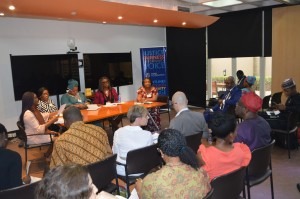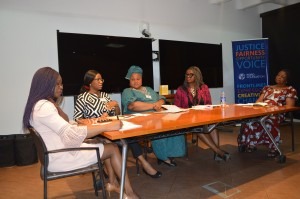Hilary Pennington, Executive Vice President and Xavier Briggs, Vice President of the Ford Foundation visited Lagos, Nigeria in February 2018. A panel discussion organized on February 20, 2018 at the Ford Foundation Office in West Africa, provided an opportunity for the Foundation’s leadership to meet with grantees and partners to discuss how extractive industries can benefit better countries and local communities.
SPACES FOR CHANGE participated in the all-women panel comprising Eva Kouka, Programme Officer of the Ford Foundation, Faith Nwadishi, member of the international Board of the Extractive Industries’ Transparency Initiative (EITI), Hannah Owusu-Koranteng, Associate Executive Director of the Ghana-based environmental justice movement, WACAM, Abiodun Baiyewu-Teru, Executive Director of Global Rights Nigeria and Victoria Ibezim-Ohaeri, Executive Director of Spaces for Change. The women shared experiences of their research and advocacy engagements with policymakers and communities affected by petroleum exploration and mining activities in West Africa.
S4C’s Victoria Ohaeri’s shared how the organization started as a Facebook group and now metamorphosed into a leading group advocating for energy policy reforms in Nigeria. Spaces for Change (S4C) started on Facebook in May 2011 as an online movement with an objective to provide a coordinated platform for the youth to engage in an informed debate about social and economic policies and programs in Nigeria. The online discussion forum capitalized on the accessibility of the social media to promote youth debate and engagement in critical issues bordering on human rights, economic governance, environmental justice, national security and conflict. Membership grew from 150 persons in 2011 to 1500 persons in 2012, and up to 10, 800 by 2015.
S4C built its reputation through crowd-sourcing information from people on social media. The organization used crowd sourcing techniques such as web-conferencing to solicit ideas, information and individualized input into policy researches and media campaign projects. It hosted web-conferences on Facebook, capitalizing on the networked public spheres that the social media offers. The e-Conferences usually presented ordinary citizens, especially the youth population, with the rare opportunity to interact directly with policy makers, industry experts and elected representatives. Beyond conducting researches and executing high-profile policy campaigns, S4C’s web-conferences continued to create spaces for peer debate and reflection, and in the process, facilitate citizen participation in the promotion, evaluation and setting of strategic policy directions on specific social and economic priorities.
Two major campaigns S4C launched using the social media stimulated public debates and policy dialogues and importantly, propelled citizen-based scrutiny of oil reform policies and the power sector reforms. For instance, S4C’s social media campaign on the Petroleum Industry Bill (PIB) utilized crowd-sourcing tools to publish analysis of the PIB, and facilitate multi-stakeholder policy dialogues with federal parliamentarians. An example is the e-conference – PIB and You – which had a global reach, with participation recorded mainly from Nigerians in fifteen countries across six continents: Nigeria, United Kingdom, United States, Russia, Austria, Germany, Canada, Cyprus, Ukraine, Malaysia, Philippines, France, Senegal, Kenya and Ghana. A total of four (4) analytical papers, (24) queries and (5) commentaries on the Bill were received prior to the e-conference and widely disseminated to both the lead-discussants and a global audience using the organization’s online portals and knowledge sharing platforms on the social media. 30 additional questions were received on the conference day. Issues, arguments and questions raised during the web debates were not only reported in the national media, but also presented to the Nigeria parliament at public hearings.
Through the organization’s social media campaigns, S4C also played an active role in engaging on the issue of subsidy reform. The work done around subsidy reform yielded collaborative partnerships with international research institutions. For instance, Spaces for Change and International Institute for Sustainable Development (IISD) with support from Energia, are currently implementing a four-year programme focusing on gender and energy sector research. This research builds on the organization’s past work on many gender issues in Nigeria from rape and sexual violence, to abductions and conflict. Both anecdotal and statistical evidence make it clear that women experience many kinds of disadvantages and discrimination in energy, health, education and employment. We are now working to address the structural barriers in society that prevent the full participation of women in social and economic activities that could enable fairer and more sustainable development.
Stakeholders from the private and public sector made additional contributions to the panel discussions, specifically shedding light on the steps major oil corporations (like Chevron Plc) and public institutions (like the Ministry of Solid Minerals) are taking to make lives better for the communities where they operate. Other panel discussions examined the landscape of opportunities and challenges for women and youth political participation moderated by Paul Nwulu of the Ford Foundation; as well as Africa’s place in the Fourth Industrial Revolution. The event afforded advocates an opportunity to network, and make plans to work together to take meaningful action in their communities. The Ford Foundation is committed to working with diverse actors to continue to build on the connections they made over their time at the program.
Spaces for Change is a Ford Foundation grantee, and coordinated the event in collaboration with the Foundation.






















